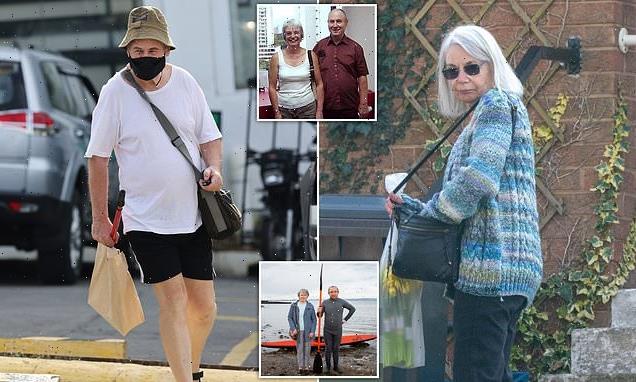Phoebe Frances Brown – who wrote a poignant play about her incurable brain cancer diagnosis – dies age 29 after four-year battle with the disease
- Phoebe Frances Brown, who wrote a poignant play about her incurable brain cancer, has died aged 29
- She died at home in Nottingham on Wednesday surrounded by her family and her partner Jake
- She starred in one-woman show The Glad Game, which followed her experience of being diagnosed with a brain tumour
- She partly wrote the show while she was in hospital and performed it at Hampstead Theatre
- Her agent Joe Powell, from Curtis Brown, said the industry had ‘prematurely lost one of its brightest stars’
Phoebe Frances Brown, who wrote a poignant play about her incurable brain cancer, has died aged 29.
The talented writer tragically died at home in Nottingham on Wednesday surrounded by her family and her partner Jake.
She was diagnosed with an incurable brain tumour affecting the areas of her brain controlling speech, language and memory in 2018.
Tragic: Phoebe Frances Brown, who wrote a poignant play about her incurable brain cancer, has died aged 29
She starred in and created one-woman show The Glad Game, which followed her experience of being diagnosed with a brain tumour.
She partly wrote the show while she was in hospital and performed it at Hampstead Theatre.
Speaking of writing the show in hospital, she previously told Brain Tumour Research: ‘The hospital Wi-Fi was shocking; Netflix wasn’t an option and there was nothing to do but write.
‘My brother brought my laptop in for me and the play started to grow and grow. I continued writing after I was discharged and it wasn’t long until I had first draft of my first play.’
Cancer: She tragically died at home in Nottingham on Wednesday surrounded by her family and her partner Jake
Heartfelt tributes from her friends and colleagues were quick to flood in after her death, with her agent Joe Powell, from Curtis Brown, saying the industry had ‘prematurely lost one of its brightest stars’.
‘Phoebe’s talent was matched only by her humour and determination,’ he added.
Tessa Walker, who directed her critically acclaimed show The Glad Game, said: ‘Phoebe was a huge talent, an incredible woman and a brilliant friend.’
While playwright Roy Williams tweeted: ‘I was only just getting to know her but already she was a wonderful presence in the writers group that I run at @Hamps_Theatre called Inspire. You are loved. You are missed.’
Talented: The writer starred in and created one-woman show The Glad Game, which followed Phoebe’s experience of being diagnosed with a brain tumour
According to The Guardian, The Glad Game producer Pippa Frith said she was ‘proud’ to be Phoebe’s friend and said ‘her laughter radiated through everything we did together’.
Hugh Adams, Head of Stakeholder Relations at Brain Tumour Research, described her one-woman show as ‘funny, incredibly poignant and gutsy’ as he paid tribute to Phoebe.
He said: ‘Brain Tumour Research remained supportive of Phoebe and the play, and I knew recent updates on Phoebe’s health hadn’t been good but this news is a real shock and our thoughts are, of course, with her family and friends at this desperate time.
‘She memorably said that her tumour affected the area of her brain that controls speech, language and memory and that the key tools of being an actress are speech, language and memory.
Cancer: Phoebe was diagnosed with an incurable brain tumour affecting the areas of her brain controlling speech, language and memory in 2018
‘A uniquely challenging disease that was uniquely challenged and described by Phoebe.’
Previously telling Brain Tumour Research about her cancer diagnosis, Phoebe said she initially thought her symptoms were due to tiredness after performing at Edinburgh Fringe Festival.
She told the charity: ‘The festival is always intense; you work hard and play hard, so it wasn’t all that surprising that I was feeling exhausted and suffering from headaches.
‘Things didn’t improve after The Fringe, however, and in September it all got a bit more serious. I would wake up feeling sick in the early hours of the morning, stumble to the toilet then vomit.’
MRI scans later revealed a large brain tumour on the left side of her brain and she underwent chemotherapy, radiotherapy and surgery.
Career: Phoebe (pictured with Bryan Cranston) partly wrote The Glad Game while she was in hospital and performed it at Hampstead Theatre
Throughout her treatment, the dedicated performer continued to work and quickly began rehearsals for National Theatre’s Small Island. She shared the role with her understudy as she battled the illness.
Phoebe went on to write her one-woman show The Glad Game while she was in hospital, saying she was determined to find ‘joy’ in the darkest of times.
She added: ‘I wanted to write and perform a play about life being stranger than fiction; that even after receiving the most devastating news, there’s still hilarity and joy to be had. There are still things to be glad about.’
Phoebe most recently starred in BBC’s comedic short film Hung Out To Dry, which she wrote during the Covid-19 pandemic, while she also played Constance Pettigrew in the BBC Radio 4 series Home Front.
Her theatre credits include Donmar Warehouse’s The Way of The World and Sorry, at the Soho Theatre, the National Theatre’s If We Were Older and Life According to Saki, at the New York Theatre Workshop.
Acting: Phoebe last starred in BBC’s comedic short film Hung Out To Dry, which she also wrote, while she also played Constance Pettigrew in the BBC Radio 4 series Home Front
Source: Read Full Article








